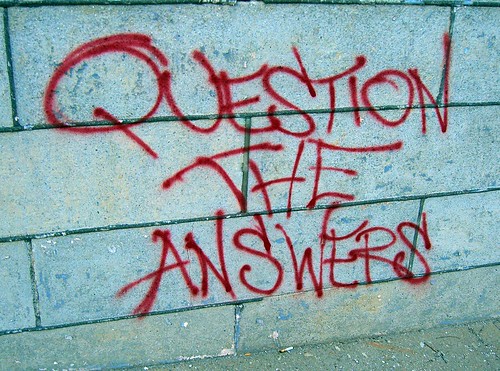Generally speaking, questions need answers, but a colleague reminded me this past week that some answers need questions too.
Learning slows down drastically, or even stops completely when we get to a point where we believe we know everything we need to know about something. When we think we have all the answers, perhaps that is when we need to question things even more. Innovation to me isn’t necessarily a completely new approach, idea or process. Innovation can often mean a retooling of elements that already exist.
“The real voyage of discovery consists not in seeking new landscapes, but in having new eyes.” ― Marcel Proust
At the heart of inquiry is the art of questioning. I believe the “voyage of discovery” Proust refers to is entirely about perspective. When learners instigate their own and others thoughts through questioning they are pushing the boundaries of perspective. Challenging our conventions about learning and knowledge happens in that cognitive place where time is taken to deconstruct what we think we know about how things should be, and where unencumbered thought magically turns into innovation. I am encouraging this process within my classroom.
I teach humanities in an inquiry based school. I am working with my seventh grade students to help them understand how to provoke thought through the art of questioning. We are trying to regain the perspective that I am sure every one of us had during our preschool years. In our exploration of thinking and questioning we have agreed that young kids are very inquisitive and unafraid to make mistakes. Their learning is rather organic and fluid, and they are less afraid to make mistakes understanding perhaps implicitly, that mistakes are actually perspective adjusters that allow us to refine understanding and improve skills as we reflect on them and make adaptations for the next time.
Young children are mindful in this manner. Something happens to us as we get older, and we seem to lose this mindful perspective toward mistake-making. We begin to think of mistakes as inherently negative occurrences that reflect a lack of ability or knowledge instead of necessary elements along the voyage of discovery. It would be easy to say that school does this to us, but I don’t believe that. There is absolutely no reason why a mindful perspective that accepts mistakes as necessary elements of learning cannot work in schools for students, but perhaps more importantly, for teachers too. If teachers were to display vulnerability and model this perspective for students, it would be an indication that they haven’t lost their ability to see learning through a young child’s eyes… and that would be a very good thing. It would mean that they were joining their students on voyages of discovery that define questions more readily than answers.
I think we can ensure that our learning spaces are the type that will be adored by kids; magical places in their eyes that provide opportunities to discover, question, explore and share without fear of scrutiny or failure. They should be places where mistakes are welcome elements of the learning process. After all, if mistakes were the end of the world, nobody would ever learn how to ride a bike. I have been in many classrooms like this, and each one was physically different. It’s about the way a place makes you feel, not what the place looks like. I think the term learning spaces includes a broad range of elements. Learning spaces can be physical, measured by time, cognitive, interactive, digital, global, local, individual, collective, collaborative, personal, public… and the list goes on. The important part is that all of them should be contextualized as navigation points on each person’s voyage of discovery; places to be explored, questioned and appreciated.
As teachers and students move within and through the diverse learning spaces that classrooms can be everyday, they become traveling partners within each others learning journeys, and they become part of each others learning stories. This is how I like to think of the interaction between teachers and students. We are traveling companions sharing our stories with each other until it is time to move into different learning spaces, and then we meet new companions to take new voyages with that lead to new places to be explored and appreciated; the places where answers get questioned and together, we become innovators.


